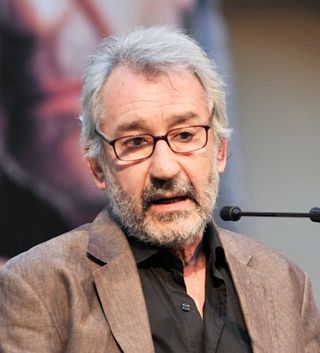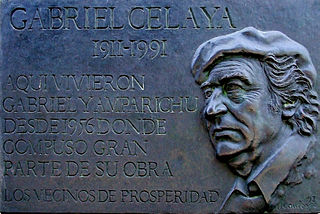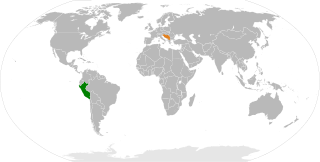
Francisco Alejandro Pérez Martínez, better known as Francisco Umbral, was a Spanish journalist, novelist, biographer and essayist.

Guillermo Cabrera Infante was a Cuban novelist, essayist, translator, screenwriter, and critic; in the 1950s he used the pseudonym G. Caín, and used Guillermo Cain for the screenplay of the cult classic film Vanishing Point (1971).
Pedro Aguayo Damián better known as "(El) Perro Aguayo" and El Can de Nochistlan was a Mexican wrestler through the 1970s to the 1990s.

Javier Marías Franco was a Spanish author, translator, and columnist. Marías published fifteen novels, including A Heart So White and Tomorrow in the Battle Think on Me. In addition to his novels, he also published three collections of short stories and various essays. As one of Spain's most celebrated novelists, his books have been translated into forty-six languages and were sold close to nine million times internationally. He received several awards for his work, such as the Rómulo Gallegos Prize (1995), the International IMPAC Dublin Literary Award (1997), the International Nonino Prize (2011), and the Austrian State Prize for European Literature (2011).
The NWA World Middleweight Championship was a professional wrestling championship in the National Wrestling Alliance (NWA) between 1939 and 2010. For most of its existence, it was defended in the Mexican lucha libre promotion Consejo Mundial de Lucha Libre (CMLL), who called it the Campeonato Mundial Peso Medio de NWA. As it is a professional wrestling championship, its holders were determined by promoters or promotions, not by athletic competition. The official middleweight limits in lucha libre are 82 kg (181 lb) to 87 kg (192 lb), but this rule is broken when convenient.

The NWA World Welterweight Championship is an inactive professional wrestling championship governed by the National Wrestling Alliance (NWA) and most recently promoted by NWA Mexico. The championship was originally created in 1946 by the Mexican promotion Consejo Mundial de Lucha Libre (CMLL). As with all professional wrestling championships, matches for the NWA World Welterweight Championship were not won or lost competitively but by a pre-planned ending to a match, with the outcome determined by the CMLL bookers and match makers. CMLL controlled the championship from 1946 until 1996 and again from 2007 until 2010. From 1996 until 2007 the championship was promoted mainly in Japan, initially as one of eight championships that made up the New Japan Pro-Wrestling (NJPW) J-Crown Championship. After the J-Crown was discontinued the title remained in Japan promoted by the Toryumon federation until 2007 when it returned to Mexico and CMLL. CMLL was a member of the National Wrestling Alliance (NWA) until the late 1980s but chose to keep the championship and the NWA prefix after leaving the NWA.

Brian J. Ford HonFLS HonFRMS is an independent research biologist, author, and lecturer, who publishes on scientific issues for the general public. He has also been a television personality for more than 40 years. Ford is an international authority on the microscope. Throughout his career, Ford has been associated with many academic bodies. He was elected a Fellow of Cardiff University in 1986, was appointed Visiting Professor at the University of Leicester, and has been awarded Honorary Fellowship of the Royal Microscopical Society and of the Linnean Society of London. In America, he was awarded the inaugural Köhler Medal and was recently recipient of the Ernst Abbe medal awarded by the New York Microscopical Society. In 2004 he was awarded a personal fellowship from NESTA, the National Endowment for Science, Technology and the Arts. During those three years he delivered 150 lectures in scores of countries, meeting 10,000 people in over 350 universities around the world.
The Mexican National Middleweight Championship(Campeonato Nacional de Peso Medio) is a professional wrestling championship controlled by the Comisión de Box y Lucha Libre Mexico D.F.. The official weight definition of the middleweight division in Mexico is from 82 to 87 kg. The championship was created in 1933 and was promoted regularly until December 8, 2008. Empresa Mexicana de Lucha Libre (EMLL) had control of the championship from its creation until 1992, at which point it was transferred to Lucha Libre AAA Worldwide (AAA). The championship's history between 1933 and 1937 is only partially known; for some periods it is unclear who held the championship. The first champion was Yaqui Joe; records of the identity of his opponent for the championship are unclear. In early 2009, AAA stopped promoting all Mexican National Championships, opting to focus on its AAA-branded championships instead. In 2021, the championship was reactivated by Consejo Mundial de Lucha Libre, with Templario defeating Dragón Rojo Jr. to win the vacant title.

The UWA World Welterweight Championship is a championship in professional wrestling that is primarily contested for in various Lucha Libre promotions in Mexico. In 1993, the championship was recognized by the Japanese professional wrestling promotion Michinoku Pro, following Super Delfin's victory over then champion Celestial. In 1995, Gran Hamada was stripped of the championship, because he exceeded the weight limit. The championship returned to being primarily contested for in Mexico, and it wasn't until Taiji Ishimori's victory over Super Crazy in 2003 that a Japanese wrestler would hold the championship again.

José María Sacristán Turiégano, better known as José Sacristán, is a Spanish film, theatre, and television actor.
Los Payasos de la Tele is the name by which a trio of popular Spanish clowns are known, initially formed by Gaby, Fofó and Miliki, and succeeded by Fofito, Milikito and Rody. They were well-known on Spanish language television in Latin America throughout much of the twentieth century before returning to Spain and attaining further success.

Federico Andahazi is an Argentine writer and psychologist.

The Mexican National Tag Team Championship(Campeonato Nacional de Parejas) is a national Mexican professional wrestling championship controlled by the Comisión de Box y Lucha Libre Mexico D.F. and competed for by two-man tag teams. The championship was created in 1957, promoted regularly until 2003, and intermittently until 2011 when the last known defense took place. Empresa Mexicana de Lucha Libre (EMLL) had control of the championship from its creation until 1992, at which point it was transferred to AAA. The championship history up until 1982 is only partially known, with periods of times where it is unclear who held the championship, but it is generally accepted that the lineage began in 1957 when Los Hermanos Shadow won an eight-team tournament to be crowned champions. The championship was reintroduced in 2020 after previously being abandoned in 2011.
Iñigo Moré is a Spanish researcher and non-fiction writer focused on the meaning of globalization for many developing countries, that most times include economic inequality, migration, illicit financial flows and migrants' remittances. Moré has authored six written books, including The Borders of Inequality, that was considered as “one of the most anticipated books “ of 2011 by Huffington Post and an “important contribution to border studies”. Moré considers that borders are "areas of discountinuity", and that they may exist independently of their political configuration. As geography creates "natural borders", economic inequality has also the capacity to create borders. Not only between nations, but also within them, as it happens between the richest and poorest neighbourhoods of the world's main cities.

Gabriel Celaya was a Spanish poet. Gabriel settled in Madrid and studied engineering, working for a time as a manager in his family's business.

Juntos por el Cambio is a political coalition in Argentina. A big tent coalition, it was created in 2015 as Cambiemos, and renamed in 2019. It is composed of Republican Proposal, Radical Civic Union, Civic Coalition ARI and United Republicans.

Mercedes D'Alessandro is an Argentinean writer and economist. She wrote the book Feminist Economics: How to Build an Egalitarian Society , published in Argentina, Mexico, Colombia, and Spain, and currently in its fifth issue. D'Alessandro is also a co-founder of the digital publication Economia Femini(s)ta. This publication's goal is to produce and promote economic information with a gender perspective.

Federal Consensus was a electoral coalition in Argentina formed to support the alliance between Roberto Lavagna and Juan Manuel Urtubey in 2019 general election. It is formed by dissidents of the Justicialist Party, the Socialist Party, the Freemen of the South Movement, the Federal Party, the Christian Democratic Party, the Third Position Party and the Light Blue and White Union.
"Cardo o ceniza" is a song written and performed by Chabuca Granda. It was written in 1973 and tells of the passionate desire and shame felt by Chilean singer-songwriter Violeta Parra after being rejected by her lover, Gilbert Favre.

Peru–Yugoslavia relations were historical foreign relations between Peru and Yugoslavia. Both countries had amicable relations and were active in the Non-Aligned Movement which was established in Belgrade in 1961. Peru had an embassy in Belgrade until 2006 and Yugoslavia, later Serbia, had an embassy in Lima until 2009.













